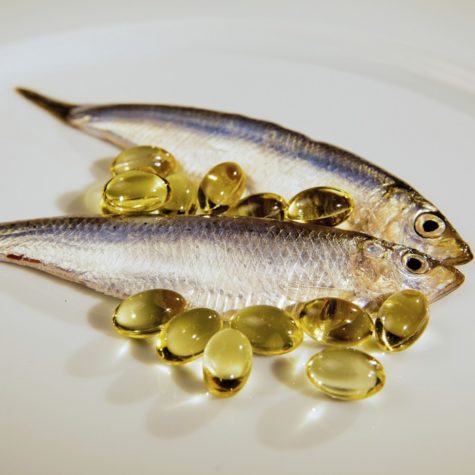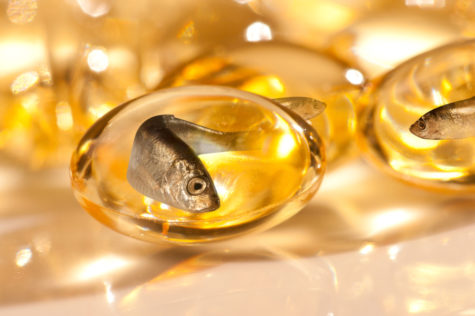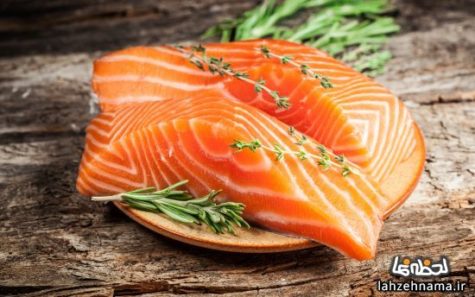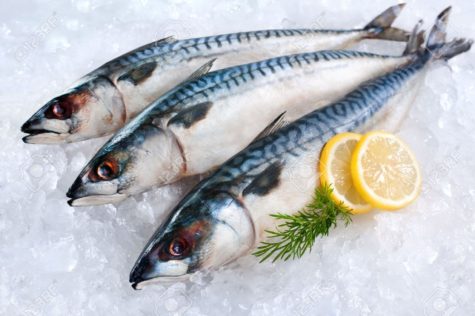Fish
Where To Get The Most Omega-3s
You usually find the most omega-3 fat in the fattiest fish from the coldest deep sea. Richest sources are:
- Mackerel
- Anchovies
- Herring
- Salmon
- Sardines
- Lake trout
- Atlantic sturgeon
- Tuna
Moderate amounts are found in the following:
- Turbot
- Bluefish
- Striped bass
- Shark
- Rainbow smelt
- Swordfish
- Rainbow trout
Shellfish – crab, lobster, shrimp, mussels, oysters, clams and squid – contain lesser amounts of omega-3s.
To get the most omega-3 benefits, bake or poach fish. Frying or otherwise adding fat, especially vegetable oils high in omega-6s, decreases the omega-3 potency in the fish.
Choose tuna packed in water and sardines canned without oil, unless it is a sardine oil, noted on the label as sild Added oils, such as soybean oil, can diminish the omega-3s. Also, draining oil from the canned tuna washes away from 15 to 25 percent of the omega-3s, whereas draining water off washes away only 3 percent.
You can also get some omega-3s in certain plant foods. The highest concentrations are in walnuts, flaxseed and rapeseed (from which canola oil is made) and purslane, a green leafy vegetable that grows wild in the United States and is commonly eaten in Europe and the Middle East. However, plant omega-3s appear to be only one-fifth as potent as marine omega-3s in fostering beneficial reactions in cells.
From: Food Your Miracle Medicine
Fish Oil For Prevention
The following is a list of various disorders that fish oil may alleviate or prevent:
- Rheumatoid arthritis: Reduces joint pain, soreness, stiffness, fatigue.
- Heart attacks: Cuts the odds of subsequent heart attacks by one-third.
- Clogged arteries: Keeps arteries open and clear. Eaters of fatty fish have less atherosclerosis. Reduces risk of reclosure of arteries after angioplasty surgery by 40 to 50 percent.
- High blood pressure: Eliminates or reduces the need for pharmaceutical pressure-lowering medications.
- Ulcerative colitis (inflammatory bowel disease): In one test, eating 4.5 grams of fish oil a day – equal to that in seven ounces of mackerel – for eight months depressed disease activity by 56 percent.
- Psoriasis: Reduces itching, redness, pain in some patients, and cuts the amount of medication needed.
- Multiple sclerosis: Helps reduce symptoms in some patients.
- Asthma: Curtails attacks in some individuals.
- Migraine headaches: Lessens severity and frequency in some sufferers.
From: Food Your Miracle Medicine
The Lifesaving Power of Fish
“Our epidemic of heart disease and cancer may be the result of a human fish oil deficiency state so enormous we fail to recognize it.”
~Ewan Cameron, MD
New research underscores the enormous lifesaving power of fat in fish. Eating fatty fish can directly intervene to save people from death and disability from heart attacks. Studies have found that atherosclerosis – diseased and clogged arteries – worsens, the less marine oil a person eats.
Dr. William E. M. Lands,a pioneering researcher on fish oils, has developed a formula that he says can precisely predict an individual’s odds of heart attack; a simple finger-prick test measures a person’s blood ratio of omega-3 and omega-6 fatty acids. The higher the proportion of marine omega-3s to omega-6s, the lower the risk of heart attack. Similarly, studies reveal that a high ratio of omega-3 fatty acids to omega-6 fatty acids in the blood cuts your chances of cancer.
Although it’s largely unappreciated, our over-consumption of omega-6 oils, prevalent in margarine, salad oil, cooking oil and processed food, is helping create a health disaster. It is true, heart authorities first encouraged the widespread use of such vegetable oils to lower blood cholesterol, not suspecting the oils could have detrimental effects on other aspects of health, such as fostering inflammatory diseases, lowering immunity and promoting cancer. Such omega-6 oils are well-documented villains in augmenting cancer incidence, cancer spread and deaths in laboratory animals.
The only way to correct this abnormal and alarming fat imbalance in cells is to cut back drastically on foods rich in omega-6s and increase the intake of marine omega-3s, say experts. The impact is almost immediate. Within 72 hours, you can see a beneficial biochemical impact in tissue by eating three and a half ounces of fish a day, studies indicate.
It is smart to eat fish, especially fatty fish such as salmon, sardines, mackerel, herring and tuna, at least two or three times a week. However, adding any amount of seafood to a seafood-poor diet can readjust our fatty acid balance somewhat, helping curtail not only heart disease, but the many modern disorders linked to a “seafood fat deficiency.”
Research shows that eating just an ounce of fish a day may help restore our cells to healthy functioning, saving countless people from disability and premature death inflicted by the unimagined consequences of fat’s pharmacological powers.
From: Food Your Miracle Medicine
The Best and Worst of Fish
Unfortunately, fish, such an ancient benefactor, is sometimes contaminated with modern poisons, such as pesticides and other industrial chemicals. Here are ways to get the most health benefits from fish with the least hazards.
- Choose saltwater ocean fish over freshwater fish from streams, rivers and lakes, which are more apt to be polluted.
- Avoid sport fish caught by recreational fishermen in lakes and streams. They are most likely to be contaminated.
- Choose smaller fish over larger fish. Small fish, like sardines, have had fewer years of exposure to pollutants.
- Eat a variety of fish instead of just one type. This reduces the risk of overdosing on one contaminated source.
- Don’t eat fish skin, which is a prime depository of toxic chemicals.
- For a safer bet, you can choose farm-raised fish, such as catfish and salmon, not likely to be contaminated; however, they usually have less omega-3 type oil than wild fish.
- Don’t over do it. Although some populations, such as Japanese fishermen and Eskimos, with low disease rates eat fish every day, sometimes as much as a pound, it’s not necessary to eat so much to reap the benefits of fish. Most studies suggest that regularly eating fish two or three times a week can make a tremendous dent in heart disease, cancer and other chronic diseases.
- A special caution for pregnant women whose fetuses could be damaged by toxic chemicals. Forgo fish from inland waters, and restrict swordfish, shark and fresh tuna to once a month. Some experts also advise pregnant women not to eat more than 7 ounces of tuna a week.
Source: Food – Your Miracle Medicine
It’s Smart To Eat Fish
It is smart to eat fish, especially fatty fish such as salmon, sardines, mackerel, herring and tuna, at least two or three times a week. Research shows that eating just an ounce of fish a day may help restore our cells to healthy functioning, saving countless people from disability and premature death.
Here is a list of disorders that fish oil may alleviate or prevent:
- Rheumatoid arthritis – Reduces joint pain, soreness, stiffness, fatigue.
- Heart attacks – Cuts the odds of subsequent heart attacks by one third.
- Clogged arteries – Keeps arteries open and clear. Reduces risk of reclosure of arteries after angioplasty surgery by 40 to 50 percent
- High Blood Pressure – Eliminates or reduces the need for pharmaceutical pressure-lowering medications.
- Ulcerative colitis (inflammatory bowel disease) – In one test, eating 4.5 grams of fish oil a day (equal to that in 7 ounces of mackerel) for 8 months depressed disease activity by 56 percent. Another test reduced need for prednisone, a steroid, by one third.
- Psoriasis – Reduces itching, redness, pain in some patients, and cuts the amount of medication needed.
- Multiple Sclerosis – Helps reduce symptoms in some patients.
- Asthma – Curtails attacks in some individuals.
- Migraine Headaches – Lessens severity and frequency in some sufferers.







